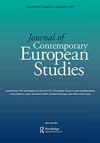The European Union as a Global Counter-Terrorism Actor
IF 1.8
3区 社会学
Q1 AREA STUDIES
引用次数: 0
Abstract
The 2023 Global Terrorism Index reveals that terrorist attacks and deaths from terrorism declined in 2022. However, several countries still face the challenge of terrorism, which has ripple effects on the global community. Additionally, the use of emerging technologies for financing and carrying out terrorism has complicated global efforts to effectively respond to terrorist acts (Institute for Economics and Peace 2023). Given the complexity of the terrorism landscape, more capable actors with innovative approaches to combat terrorism are required. The European Union as a Global Counter-Terrorism Actor, penned by three senior scholars in international security studies, aims to demonstrate the EU’s actorness in countering terrorism worldwide. The manuscript employs a combination of theory and empirical evidence to argue that the EU has grown as a global counterterrorism actor since the turn of the century, evolving from having almost no role in counterterrorism in 2001 to becoming a significant actor two decades later. The book adopts the ‘collective securitization’ framework, which was initially developed by James Sperling and Mark Webber in their 2019 research paper, to illustrate the collective securitization of terrorism in the EU following the events of 9/11 (Sperling and Webber 2019). The concept of collective securitization involves securitization within a regional arrangement, such as the EU, and its process consists of six stages:欧洲联盟作为全球反恐行动者
2023年全球恐怖主义指数显示,恐怖袭击和恐怖主义造成的死亡人数在2022年有所下降。然而,一些国家仍然面临恐怖主义的挑战,这对国际社会产生了连锁反应。此外,利用新兴技术资助和实施恐怖主义,使有效应对恐怖主义行为的全球努力复杂化(经济与和平研究所2023年)。鉴于恐怖主义形势的复杂性,需要更有能力的行动者以创新的方式打击恐怖主义。《欧盟作为全球反恐行动者》由三位国际安全研究领域的资深学者撰写,旨在展示欧盟在全球反恐方面的角色。这份手稿结合了理论和经验证据,论证了自世纪之交以来,欧盟已经成长为一个全球反恐参与者,从2001年在反恐方面几乎没有任何作用,发展到20年后成为一个重要的参与者。本书采用了“集体证券化”框架,该框架最初是由詹姆斯·斯珀林和马克·韦伯在2019年的研究论文中提出的,以说明9/11事件后欧盟恐怖主义的集体证券化(Sperling and Webber 2019)。集体证券化的概念是指在一个区域安排内的证券化,如欧盟,其过程包括六个阶段:
本文章由计算机程序翻译,如有差异,请以英文原文为准。
求助全文
约1分钟内获得全文
求助全文
来源期刊

Journal of Contemporary European Studies
Multiple-
CiteScore
2.70
自引率
7.70%
发文量
84
期刊介绍:
The Journal of Contemporary European Studies (previously Journal of European Area Studies) seeks to provide a forum for interdisciplinary debate about the theory and practice of area studies as well as for empirical studies of European societies, politics and cultures. The central area focus of the journal is European in its broadest geographical definition. However, the examination of European "areas" and themes are enhanced as a matter of editorial policy by non-European perspectives. The Journal intends to attract the interest of both cross-national and single-country specialists in European studies and to counteract the worst features of Eurocentrism with coverage of non-European views on European themes.
 求助内容:
求助内容: 应助结果提醒方式:
应助结果提醒方式:


